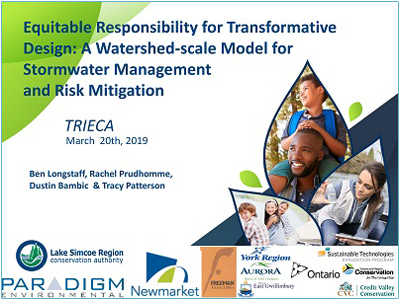TRACK 1
Equitable Responsibility for Transformative Design: A Watershed-scale Model for Stormwater Management and Risk Mitigation
PRESENTERS
Ben Longstaff, Lake Simcoe Region Conservation Authority (LSRCA)
Rachel Prudhomme, Town of Newmarket
ABSTRACT
Stormwater management (SWM) is an increasingly complex challenge for all municipalities across Canada due to the significant and growing burden on resources and capacity. Major challenges relate to the cost of aging infrastructure, as well as areas that are either under-serviced or lacking stormwater infrastructure, or have insufficient resources.
Combined with urbanization and climate change, we are witnessing an unprecedented increase in issues such as flooding, erosion and water quality impairment.
We contend that for these issues to be resolved, a paradigm shift in stormwater management is needed; this shift must ensure stormwater is managed at a watershed scale and optimized for the greatest environmental outcomes at the greatest cost efficiency.
This presentation will provide initial results of a first-of-its-kind comprehensive analysis of basin-scale, integrated SWM infrastructure (green and grey infrastructure) employing an equitable responsibility methodology for shared municipal SWM planning and design.
The goal of this project is to complete a detailed analysis applying principles of aggregation, integration, scale and distribution to achieve optimal SWM system performance at the greatest cost efficiency within the East Holland River subwatershed, Lake Simcoe.
The project will assess SWM optimization opportunities under multiple growth, climate change, planning, policy and fiscal management scenarios. These findings will be used to secure policy shifts in support of whole system, nature-based, integrative and transformative planning and design of SWM infrastructure.
Learning Objectives
1. Provide the audience with an understanding of the multitude of challenges associated with effectively managing stormwater infrastructure. These challenges relate to the cost of aging infrastructure, under-serviced infrastructure, continued urbanization and climate change.
2. Given the multiple challenges to effectively manage stormwater, business as usual is not the solution: a paradigm shift is needed. This paradigm shift should be based on implementing a watershed-scale, cost-optimized solution to achieve the best possible environmental outcomes. The solution needs to assess the concept of equitable responsibility, whereby the financial benefit of managing on watershed boundaries rather than municipal boundaries is assessed.
3. Identify how the preliminary outcomes of this pilot project may inform SWM planning in the Town of Newmarket, and how this approach can be used to inform SWM planning and design in other jurisdictions
ABOUT THE PRESENTERS

Ben Longstaff
Ben Longstaff is the general manager of Integrated Watershed Management with Lake Simcoe Region Conservation Authority (LSRCA). In this role, Ben provides leadership, support and strategic direction to the Authority’s watershed planning, climate change, source water protection, urban restoration and environmental monitoring programs.
Prior to joining LSRCA, Ben spent five years with the University of Maryland, where he worked in partnership with the National Oceanic and Atmospheric Administrative (NOAA).

Rachel Prudhomme
Rachel Prudhomme is the director of engineering for the Town of Newmarket. Prior to this, she spent 24 years as president of a firm specializing in innovative research, completing projects in Ontario, Quebec, South America and Europe. She has also spent time in academia as both a lecturer and a dean.
She has served on many provincial advisory councils, as well as the Premier’s Research Excellence Awards Board, the Northern Centre for Advanced Technology, ORTECH International, Science North and numerous other boards.

